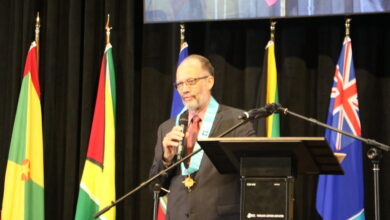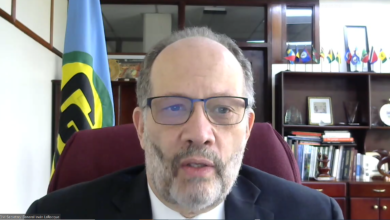Your Excellency Michel Martelly, President of the Republic of Haiti and Chairman of the Conference of Heads of Government of the Caribbean Community,
Honourable Oliver Joseph, Minister of Economic Development, Planning, Trade and Cooperatives of Grenada and Chairman of the CARICOM Council for Trade and Economic Development,
Honourable Wilson Laleau, Minister of Finance and the Economy and Minister of Trade and Industry of Haiti,
Other Honourable Ministers,
Mr. Pascal Lamy, Director-General of the World Trade Organisation,
Our Partner Institutions,
Other Invited Guests,
Representatives of the Media.
Let me welcome all of you to this ceremony, launching the Caribbean Community Regional Aid-for-Trade (AfT) Strategy. I want to thank the Government of Haiti for graciously offering to host this event and for putting these excellent arrangements in place. The fact that it is being held here in Haiti is particularly fitting, given that President Martelly is the Chair of CARICOM.
I also extend a hearty welcome to the Director General of the World Trade Organisation Mr Pascal Lamy, a friend of the Region, who has been at the forefront in encouraging our Region to develop an Aid for Trade Strategy and graciously offered to promote it in the international community. It has taken us longer than anticipated to get to this point and even as he demits office shortly, we are confident that he will urge his successor, a son of a close neighbour and friend of CARICOM, to also be a champion of the Strategy.
To our Partner Institutions, I bid you a warm Caribbean welcome to a country blessed with people of unbreakable spirit and indomitable courage. A special welcome also to the representatives from Eastern and Southern Africa who have readily responded to our invitation to share their experience with Aid for Trade and how they have successfully attracted significant support from the international community.
The journey to this point began when the Twenty-Seventh Meeting of the CARICOM Council for Trade and Economic Development, in May 2009, declared that “the Region should craft a Caribbean Aid for Trade Strategy, which includes a holistic and comprehensive approach towards competitiveness, adjustment and trade development.” To undertake this task we found a most willing partner in the Inter-American Development Bank and the Commonwealth Secretariat, through its Hubs and Spokes Project, which provided invaluable assistance for the development of the strategy.
Mr President, Ladies and Gentlemen, given the dynamism, intense competitiveness and deep difficulties of the global economy, small states like ours must seek all possible avenues to give them a chance at competing in the international marketplace. Global consensus over the past thirty years has been that trade expansion has a critical role to play in achieving a viable, prosperous and above all sustainable, path to development.
Twenty four years ago in designing the CARICOM Single Market and Economy, the intention was not only to foster greater intra-regional trade but also to expand trade between CARICOM and Third States. The latter objective was viewed as a crucial driver for creating and maintaining growth and having a positive impact on the economic and social welfare of the Region.
CARICOM Member States have negotiated a number of bilateral and multilateral trade agreements. However, both the public and private sectors require assistance to be in a position to maximise the opportunities available under these agreements and to meet the commitments which they have signed on to.
There is no doubt that in order to meet those objectives, Aid for Trade has become a vital element in our approach. Market access must be converted to market presence if CARICOM Member States are to compete equitably in the global market. Resources made available under Aid for Trade would help in this regard.
The national consultations pointed to a range of areas to be addressed. These areas include, but are not limited to, upgrading key economic infrastructure, enhancing export competitiveness, diversifying economies, re-tooling the private sector, strengthening regional integration and creating financial and other instruments for encouraging and supporting innovation and research and development. These areas require substantial resources if the Strategy is to realise its goals.
Additionally, CARICOM Heads of Government have identified Maritime Transport and Information and Communication Technology (ICT) as two key areas for the development of transformational projects using Aid for Trade resources. In the consultations on the Regional Strategy, stakeholders identified reliable and less costly energy supplies as a third critical area. Also, the Strategy highlights trade facilitation, sanitary and phytosanitary measures, quality infrastructure, services, private sector development as well as strengthening regional integration and the capacity of regional institutions for specific intervention. Action in those areas would enhance the competitiveness of the export sector of the economies of the Caribbean Community.
Mr President, ladies and gentlemen, the next steps would include concretising projects for Aid for Trade support. Most important is the need for development partners and the wider international community to give practical effect to their recognition at the Sixth WTO Ministerial Conference in Hong Kong in 2005 namely: “Aid for Trade should aim to help developing countries, particularly the Less Developed Countries, to build supply-side capacity and trade related infrastructure that they need to assist them to implement and benefit from Agreements and more broadly to expand their trade.” Through adherence to that undertaking, CARICOM Member States would have an opportunity to expand their trade and lessen the adjustment costs of the changing external trade environment.
A critical factor in mobilising the necessary resources is recognising that access to concessionary loans and grants is being denied to many CARICOM Member States due to graduation and differentiation. Unless urgent action is taken to change the criteria and adjust the policies which created this untenable situation, the debt per capita of some Member States, already among the highest in the world, could escalate, virtually rendering useless any loan based assistance, particularly at this time of severe fiscal and economic challenges.
The contribution of Aid for Trade to the growth and development of CARICOM countries hinges significantly on the acceptance of the international community, and our development partners in particular of the realities of our situation. In so doing it would be desirable for them to provide additional sources of financing, especially in grant form and in a manner that is easily accessible. This calls for applying innovative mechanisms in order to supply the requisite financial and technical support to CARICOM Member States.
It may be a cliché but it is worth repeating that governments don’t trade and it is no less true for us in the Caribbean. As we seek to promote this strategy, one of the most critical areas that must be targeted is building private sector capacity. The sustainability of our growth is largely dependent on the ability of the private sector to create or take advantage of entrepreneurial opportunities, provide the level of employment needed to keep the economy on course and give our people a chance to earn a decent wage.
The Caribbean Community Regional Aid for Trade Strategy has been developed with one thought predominant in its design – that of producing concrete benefits to the people of the Caribbean. This Strategy has therefore emanated from the inputs of the people of the Community and this is as it should be. Their involvement in this process is just as critical to its success as the generous support of our international partners.
That kind of support was evident in the preparation of the Strategy and in this launch. In that regard I must once again acknowledge the assistance of the Inter-American Development Bank (IDB) in the development of the Strategy. The Bank, along with the International Trade Centre, the Commonwealth Secretariat, the WTO, the European Union and our own Caribbean Export Development Agency have all collaborated with the CARICOM Secretariat and our host Haiti in staging this Launch. And I accept this co-operation and support as an encouraging sign for the success of the Strategy which would assist in transforming our economies and creating the viable, sustainable, safe and prosperous Community for which we all are striving.
I thank you




